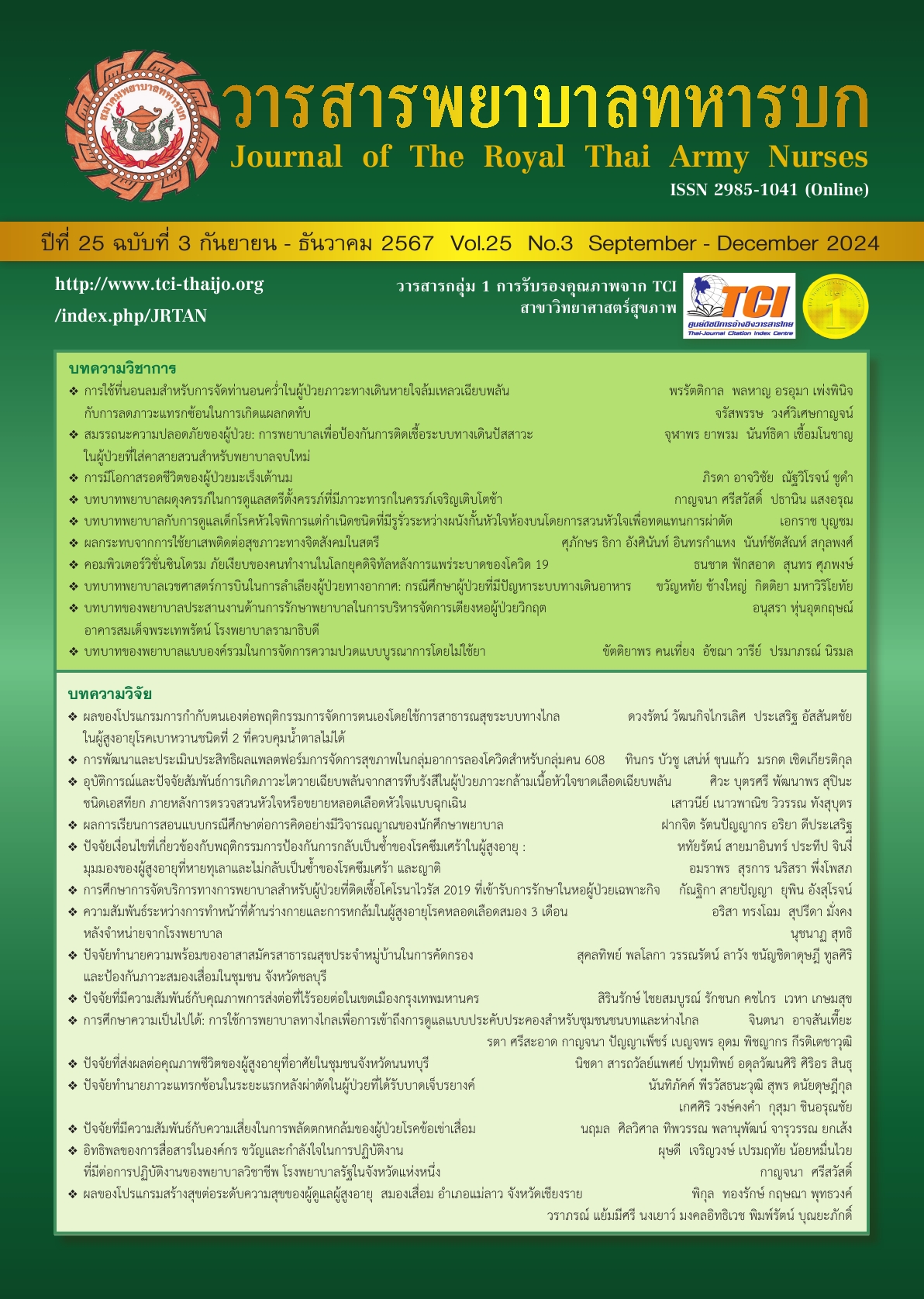Effects of Using Simulation Game Based Learning to prepare Air Force Student Nurses before Pediatric and Adolescent Nursing Practice
Keywords:
Simulation Game-Based Learning, knowledge, self-confidence in clinical practice, pediatric and adolescent nursing, Air Force Student NursesAbstract
This research was conducted in a quasi-experimental research design with a pretest and posttest in two groups, aiming to compare the average scores of knowledge and self-confidence in pediatric and adolescent nursing practice of Air Force Student Nurses between the experimental group that received preparation using a Simulation Game-Based Learning and the control group that received regular preparation. The sample group comprised 60 third-year Air Force Student Nurses in the academic year 2024. was selected by a purposive sampling method. The research instruments comprised a Simulation Game-Based Learning. Data were collected using a knowledge assessment form on nursing care for pediatric and adolescents with common diseases and a self-confidence assessment form on pediatric and adolescent nursing practice, resulting in an IOC value of 1.00, a KR-20 reliability coefficient of 0.77, and Cronbach’s alpha coefficient of 0.92. Data were analyzed using independent t-test and paired t-test.
The results revealed that the experimental group’s average scores of knowledge and self-confidence in pediatric and adolescent nursing practice were higher than in the control group. Moreover, the average scores of the experimental group after the experiment were higher than before the experiment, with statistical significance.
Nursing instructors can use Simulation Game-Based Learning to prepare nursing students before pediatric and adolescent nursing practice.
Downloads
References
Royal Thai Air Force Nursing College. Bachelor of Nursing Science (Revised Curriculum, 2018). Royal Thai Air Force Nursing College, Directorate of Medical Services, Royal Thai Air Force. 2018. (in Thai)
Wiriyanupappong W, Watcharasit R, Wannaphak T, & Suttirungrueang N. The Effect of Animated learning media on Nursing for Pediatric Patients with Ventricular Septal Defect of 3rd years Air Force Student Nurse Academic year 2023. Journal of Environmental and Community Health. 2023; 8(3): 779-86. (in Thai)
Chudjuajeen S, Wutisukpaisan S, & Narysangkharn S. The Use of High-Fidelity Simulation Based Learning in Nursing Education. Journal of Boromarajonani College of Nursing, Surin. 2021; 11(2): 149-63. (in Thai)
Chutchawan N, Yuroong A, Untaja P, & Ankanawin U. Effects of Multi-scenario Simulation Learning Program for Developing Military Nursing Performance in the Royal Thai Army Nursing Students. Journal of The Royal Thai Army Nurses. 2022; 23(2): 109-18. (in Thai)
Kolb DA. Experiential learning: Experience as the source of learning and development. Englewood Cliffs. NJ: Prentice-Hall Inc; 1984.
Pangsuk P, & Kingmala C. The Effect of SimulationBased Learning on Knowledge and SelfEfficacy of the Third Year Nursing Students in Caring for Emergency Patients. Songklanagarind Journal of Nursing. 2021; 41(2): 89-100. (in Thai)
Jamjang S, Thongthieng W, & Kumyod S. Effects of Using Online Game on Readiness Preparation of Nursing Practice for the Development of Drug Administration Knowledge for Nursing Students. The Journal of Faculty of NursingBurapha University. 2022; 30(3): 114-26. (in Thai)
Thongpradab J, Lohacheewa S, & Preeyanon L. Effects of Game-Based Learning on Nursing Students’ Knowledge of English Psychiatry Terminology. Journal of Thailand Nursing and Midwifery Council. 2022; 37(3): 111-24. (in Thai)
Hemadhulin S, Kaewviengdach C, Buahom C, Chuemuangsaen D, & Sittikan S. The Effects of Learning Management Using APGAR score Game on APGAR Score Knowledge. Journal of Health Science. 2023; 32(4): 723-31. (in Thai)
Choojun S. The effect of information giving through the two-dimension cartoon animation on preventive behavior for acute respiratory tract infection among preschool children in childcare centers. (thesis). Bangkok. Chulalongkorn University; 2019. (in Thai)
Jefferies P R A framework for designing, implementing, and evaluating simulations used as teaching strategies in nursing. Nursing education perspectives. 2005; 26(2): 96-103.
Kumkong M, Leejareon P, Aramrom Y, & Jitviboon A. Effects of Simulation-Based Learning on Perceived Self-Efficacy in Providing Nursing Care for Advanced Life Support to Patients with Critical Illness or Emergency Condition among Nursing Students. The Southern College Network Journal of Nursing and Public Health. 2016; 3(3): 52-64. (in Thai)
Chubkhuntod P, Elter P, Gaewgoontol N, & Potchana R. Effects of Simulation Based Learning Model on Knowledge, Self-Efficacy and Abilities of Applying Nursing Process Skills during Intrapartum Care of Nursing Students. Journal of Health Science. 2020; 29(6):1062-72. (in Thai)
Downloads
Published
How to Cite
Issue
Section
License
Copyright (c) 2024 Journal of The Royal Thai Army Nurses

This work is licensed under a Creative Commons Attribution-NonCommercial-NoDerivatives 4.0 International License.
บทความหรือข้อคิดเห็นใดใดที่ปรากฏในวารสารพยาบาลทหารบกเป็นวรรณกรรมของผู้เขียน ซึ่งบรรณาธิการหรือสมาคมพยาบาลทหารบก ไม่จำเป็นต้องเห็นด้วย
บทความที่ได้รับการตีพิมพ์เป็นลิขสิทธิ์ของวารสารพยาบาลทหารบก
The ideas and opinions expressed in the Journal of The Royal Thai Army Nurses are those of the authors and not necessarily those
of the editor or Royal Thai Army Nurses Association.






